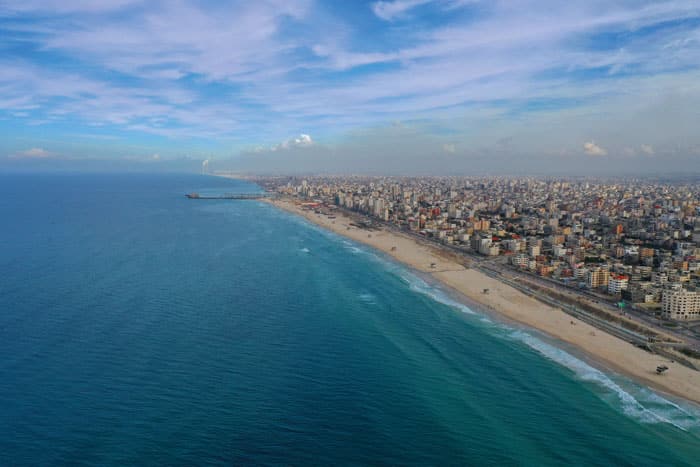 Gaza City (Abdallah ElHajj/Getty Images)
Gaza City (Abdallah ElHajj/Getty Images) As war was raging between Hamas and Israel in January 2009, I wrote a delusional column dreaming about a “Gaza Riviera.” This was nearly four years after Israel had evacuated the Gaza Strip, but instead of offering more hope for the Palestinians, it only brought more destruction and despair.
So I dreamed.
While the rockets were flying, I dreamed of a “fabulous strip of hotels and casinos right by a sparkling ocean. I imagined thousands of proud Palestinians working with smiles on their faces to serve the thousands of tourists from around the world who were coming to their little strip of ocean paradise.”
Next to this paradise, I dreamed of a “bustling economy, where the highest quality produce was grown and exported; where entrepreneurs built software companies, banks and advertising agencies; where a university attracted students from around the world; where local culture and the arts thrived.”
What made me think of that old column?
It was a statement by Israeli Prime Minister Yair Lapid in the wake of last week’s Operation Breaking Dawn, the 66-hour mini-war between Israel and Palestinian Islamic Jihad in Gaza.
“I want to turn to the residents of Gaza and say to them: There is another way,” Lapid said. “We will know to defend ourselves against anyone who threatens us, but we also know to give work and a livelihood and dignified life to anyone who wants to live peacefully beside us.”
There is another way.
If any phrase ever captured the tragedy and missed opportunities of the Palestinian story, that is it.
The Gaza disengagement served as a kind of experiment to see what Palestinians would do if Israel gave up land. If it worked in Gaza, many of us hoped, maybe it could work elsewhere.
There was broad consensus around one crucial idea– if Palestinians would choose peace, Israel would respond in kind.
“Is there any doubt that had the Palestinians chosen the ‘Riviera’ option,” I wrote in 2009, “Israel would have welcomed it? That Israel would have responded to this show of good faith and optimism with corresponding gestures of cooperation and good will? That there would have been no need for ‘suffocating closures’? That Israelis, known for their love of life and travel, would have been the first tourists to sample the delightful pleasures of this new Gaza?”
We all know what happened after Israel left Gaza. Instead of using the hundreds of millions the world showered on them to create a thriving society, Hamas used the money to build bomb factories and launch thousands of rockets at Israel.
So yes, the “Gaza Riviera” was a fantasy, but it was rooted in the hard reality that Israel would have responded to peace with peace.
We ought to keep that in mind when throwing out labels like “pro-Palestinian.” We tend to assume that the more left you are, the more you are pro-Palestinian.
In reality, “pro-Palestinian” has more to do with bashing Israel. The more you bash the Jewish state, the more pro-Palestinian you look.
In this week’s cover story on AIPAC, I argue, among other things, that bashing Israel hardly means you’re pro-Palestinian. If anything, the relentless focus on Israel hurts Palestinians the most.
I argue that the biggest enemy of the Palestinian people is not Israel but their corrupt leaders who live in fancy villas in Ramallah and put their own interests ahead of those of their people.
I argue that Palestinian leaders have an enormous incentive to maintain the status quo. “As long as Palestinian leaders refuse to end the conflict,” I write, “they can keep their lucrative victim status, spread BDS, fatten their bank accounts and take Israel to international criminal courts. What’s not to like?”
I argue that you can’t call yourself “pro-Palestinian” if you ignore “the Jew-hatred and corruption that lie at the heart of Palestinian intransigence and has contributed as much as anything to the undermining of Palestinian rights.”
I argue that if a member of Congress wanted to promote Palestinian rights, the best thing they could do would be to demand accountability from corrupt and coddled Palestinian leaders.
Of course, we rarely hear such arguments these days. It’s more popular and politically correct to patronize the victims and put all the blame and pressure on the more powerful side. This obsessive focus on Israel, however, has done little to help the Palestinian people.
As I write, “History has shown that when one leadership glorifies terrorism, marinates its society in Jew-hatred and refuses to make peace with those they despise, it is folly to let them off the hook and pressure only the other side.”
There will be greater hope for peace and a Gaza Riviera when anti-Israel members of Congress, such as Rashida Tlaib, Ilhan Omar and their allies, start becoming pro-Palestinian and hold the corrupt Palestinian leadership accountable.
Until then, they will remain Israel bashers rather than Palestinian lovers.






















 More news and opinions than at a Shabbat dinner, right in your inbox.
More news and opinions than at a Shabbat dinner, right in your inbox.